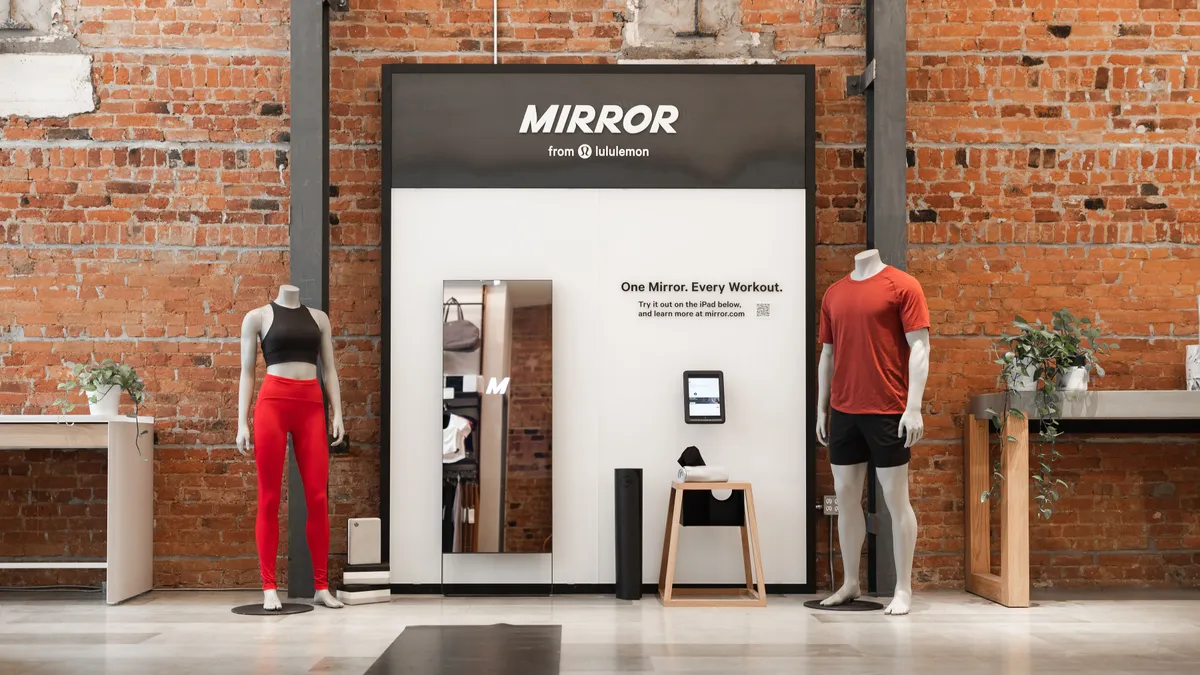Dive Brief:
- Weeks after Lululemon announced it would shift its home fitness strategy to focus more on app-based content and less on Mirror’s hardware, the athletics retailer could be exploring a sale of the business, according to Bloomberg.
- The report, which cited anonymous sources, said the retailer was working with an adviser to solicit interest in Mirror. The home fitness business has been a drag on Lululemon’s performance: CEO Calvin McDonald said in March that sales of the home fitness equipment disappointed, and the retailer took an impairment charge of $443 million related to the business in Q4.
- “We don't comment on rumors or speculation,” a Lululemon spokesperson said in response to the news, adding that the retailer’s new content strategy “will enable us to create long-term value.”
Dive Insight:
Mirror, which Lululemon acquired for $500 million in June 2020, quickly turned from a promising acquisition to an uncertain, and sometimes concerning, piece of Lululemon’s core operations.
"I think the 'socially connected fitness' trend never really achieved the hoped for participation," Matt Powell, an adviser with retail consultancy Spurwink River, said via email about the potential sale of Mirror, noting that the return to the gym led to plateauing growth in home fitness. "Peloton, Mirror and Tonal all are well off their pandemic peaks."
In 2021, barely a year after acquiring the home fitness business, McDonald said Lululemon was “playing the long-game” with Mirror, though the retailer had already flagged rising customer acquisition costs. Morgan Stanley analysts at the time noted that sentiment around the acquisition had already “cooled” thanks to Lululemon’s intentionally limited disclosures about Mirror’s financial performance.
“In our view, given limited disclosure, the Mirror acquisition has seemingly introduced noise into an otherwise clean equity story,” they said.
Since the acquisition, Lululemon has taken a variety of steps to increase adoption and tweak the home fitness company’s strategy, including selling Mirror in its stores, hiring a former Twitch executive to take over as the brand’s CEO and replacing Mirror’s fitness subscription with a new Lululemon Studio membership. The retailer also dropped the price of the Mirror hardware significantly and positioned fitness content as the main selling point of Lululemon Studio.
A year ago, McDonald was still sounding positive notes on the future of Mirror, as part of its Lululemon Studio offering.
“It’s going to generate revenue, it’s going to generate its own profitability, and it’s going to have the retention and spend benefits that you have within the loyalty program and something that’s truly unique within the marketplace,” McDonald said at the time.
But in the most recent quarter, hardware sales did not meet expectations and McDonald announced Lululemon would focus more on app-based content going forward, including through a cheaper subscription offering that does not require customers to own the Mirror device.
“As previously announced, we are shifting the focus of Lululemon Studio from a hardware-centric offering to one that is also focused on digital app-based services going forward,” a Lululemon spokesperson said. “This work is underway, and our strategy will enable us to create long-term value and build a larger community of guests with a deeper connection to Lululemon.”
While a content fitness subscription still might work for the company, GlobalData Managing Director Neil Saunders said in emailed comments in March that Mirror had “failed to resonate with the mass of consumers.”
“In our view this is because it is an expensive and relatively complex solution that too few are willing to invest in,” Saunders said at the time.
















